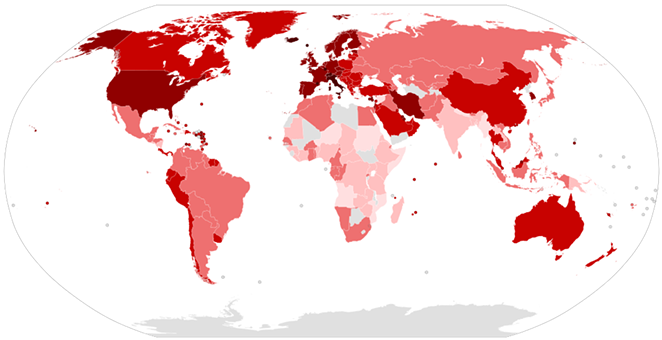
The presenters repeated and expanded on the message multiple times. Do not make physical contact with anyone outside of your immediate household. Remain 6 feet away from other people.
SCHS CEO Joe Sluka made a short presentation, showing projection models for available hospital beds and respirators in Central Oregon. He displayed a graph published by covidactnow.org that demonstrated how Oregon hospitals will become completely overwhelmed without aggressive social distancing interventions.

Sluka said the region has entered a “point of no return” requiring direct action for the next six days, or hospitals will be overrun. Hospital admissions will spike to 465 by the end of April, the projection shows, versus 117 admissions if the public works to flatten the curve. Fifty-eight new ventilators per day will be required in the region’s hospitals by April 28, versus 15 new ventilators per day required with aggressive social distancing.
Mayor Sally Russell read some quotes from Dr. Emily Landon, the chief infectious disease epidemiologist at the University of Chicago, whose speech on Saturday, March 21 went viral after Illinois went on lockdown.
“All we have to slow the spread is distance,” Landon said, as quoted by Russell. “Social distance. If we let every patient with this infection infect three more people and then each of them infect two or three people, there won’t be a hospital bed when my mother can’t breathe very well or when yours is coughing too much.”
After Russell spoke, St. Charles CEO Sluka took over the virtual floor to explain St. Charles’s three main objectives: protecting its caregivers, patients and the community.
You can’t transmit it if you don’t come in contact with it. The growth of this disease is exponential: Hospitals [in the U.S. and around the world] are being overwhelmed. -St. Charles Health System CEO Joe Sluka
tweet this
“We have two strategies to defeat COVID-19: Prevent and contain,” Sluka said. “To prevent, we need aggressive and extensive social distancing. Containing is identifying and isolating those who have COVID-19.”
Sluka said Central Oregon is still short on tests: Right now only vulnerable populations with symptoms of the coronavirus qualify to get tested. This may change quickly as more commercial tests come online.
“You can’t transmit it if you don’t come in contact with it,” he said. “The growth of this disease is exponential: Hospitals [in the U.S. and around the world] are being overwhelmed.”
Sluka said St. Charles has been prepping for many weeks and has a plan in place for a surge, and the hospital is working to “shore up” staffing.
Sluka ended his presentation with a clear call to action:
-Only leave the house for essential reasons
-Socialize only with people who live in your house
-No picnics, camping, visits to the dog park, hikes, or trips to the coast (Yes, this one will be hard Bendites!)
-Exercise alone, or keep 6 feet from the person you are with
-Enforce social distancing for kids and teenagers: no playdates or hanging out with others
Action and responsibility from the bottom up is more powerful than from the top down. -Rep. Cheri Helt
tweet this
Dr. George Conway is the Deschutes County Health Services director and has been the face of the county’s response since he reported the first COVID-19 case March 11.
“Every time you stay at home, you help the community,” Conway said. “This is not just an order for the elderly. Forty percent of people hospitalized for COVID-19 in the U.S. have been between the ages of 20-54. We’re protecting our family, friends, co-workers and saving lives.”
State Rep. Cheri Helt (R-Bend) reiterated the messages of the other presenters, encouraging social distancing.
“Action and responsibility from the bottom up is more powerful than from the top down,” she said.

Helt also focused on economic recovery, and said she believes “help is on the way” from both the state and federal government. This includes unemployment for workers, low- and no-interest loans for small businesses, and other assistance for those recently unemployed.
Helt said the Oregon state legislature will meet sometime over the next 10 days to pass emergency relief bills.
St. Charles is currently unable to replenish some of its essential supplies, including personal protective equipment, according to Dr. Jeff Absalon, chief physician executive at St. Charles. It uses 800 masks and the hospital has a “few weeks” worth of supplies on hand, Absalon said. SCHS has 270 beds between its four Central Oregon hospitals, it is working to double its capacity. By canceling all elective surgeries, the hospital has more beds available than usual.
Helt reported that the State of Oregon has—as of this afternoon—received 45% of the emergency supplies it requested from the federal government, including 87,000 masks, 9,000 gowns, 14,000 gloves.
Absalon concluded that the only people that should go to the emergency department are those with a fever, cough and a significant shortness of breath. Those without a shortness of breath should contact their primary care provider.
“Just look to Italy and New York,” Absalon said. “I’m begging you to stay home, stay home now. Our caregivers don’t have a choice.”
See all our Coronavirus coverage at our Coronavirus HQ.






















